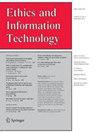The contested role of AI ethics boards in smart societies: a step towards improvement based on board composition by sortition
IF 3.4
2区 哲学
Q1 ETHICS
引用次数: 0
Abstract
Abstract The recent proliferation of AI scandals led private and public organisations to implement new ethics guidelines, introduce AI ethics boards, and list ethical principles. Nevertheless, some of these efforts remained a façade not backed by any substantive action. Such behaviour made the public question the legitimacy of the AI industry and prompted scholars to accuse the sector of ethicswashing, machinewashing, and ethics trivialisation—criticisms that spilt over to institutional AI ethics boards. To counter this widespread issue, contributions in the literature have proposed fixes that do not consider its systemic character and are based on a top-down, expert-centric governance. To fill this gap, we propose to make use of qualified informed lotteries : a two-step model that transposes the documented benefits of the ancient practice of sortition into the selection of AI ethics boards’ members and combines them with the advantages of a stakeholder-driven, participative, and deliberative bottom-up process typical of Citizens’ Assemblies. The model permits increasing the public’s legitimacy and participation in the decision-making process and its deliverables, curbing the industry’s over-influence and lobbying, and diminishing the instrumentalisation of ethics boards. We suggest that this sortition-based approach may provide a sound base for both public and private organisations in smart societies for constructing a decentralised, bottom-up, participative digital democracy.人工智能伦理委员会在智能社会中有争议的角色:朝着基于董事会组成的改进迈出的一步
最近人工智能丑闻的激增导致私人和公共组织实施新的道德准则,引入人工智能道德委员会,并列出道德原则。然而,其中一些努力仍然是表面功夫,没有得到任何实质性行动的支持。这种行为使公众质疑人工智能行业的合法性,并促使学者们指责该行业的道德清洗、机器清洗和道德庸俗化——这些批评蔓延到了机构人工智能伦理委员会。为了应对这个广泛存在的问题,文献中的贡献已经提出了不考虑其系统特征的修复方法,并且基于自上而下的、以专家为中心的治理。为了填补这一空白,我们建议使用合格的知情抽签:一个两步模型,将古老的分类实践的记录好处转化为人工智能伦理委员会成员的选择,并将其与利益相关者驱动的、参与式的、自下而上的审议过程的优势结合起来。该模式允许提高公众在决策过程及其成果中的合法性和参与度,遏制该行业的过度影响和游说,并减少道德委员会的工具化。我们认为,这种基于解决方案的方法可以为智能社会中的公共和私人组织提供一个健全的基础,以构建一个分散的、自下而上的、参与式的数字民主。
本文章由计算机程序翻译,如有差异,请以英文原文为准。
求助全文
约1分钟内获得全文
求助全文
来源期刊

Ethics and Information Technology
Multiple-
CiteScore
8.20
自引率
5.60%
发文量
46
期刊介绍:
Ethics and Information Technology is a peer-reviewed journal dedicated to advancing the dialogue between moral philosophy and the field of information and communication technology (ICT). The journal aims to foster and promote reflection and analysis which is intended to make a constructive contribution to answering the ethical, social and political questions associated with the adoption, use, and development of ICT. Within the scope of the journal are also conceptual analysis and discussion of ethical ICT issues which arise in the context of technology assessment, cultural studies, public policy analysis and public administration, cognitive science, social and anthropological studies in technology, mass-communication, and legal studies.
 求助内容:
求助内容: 应助结果提醒方式:
应助结果提醒方式:


